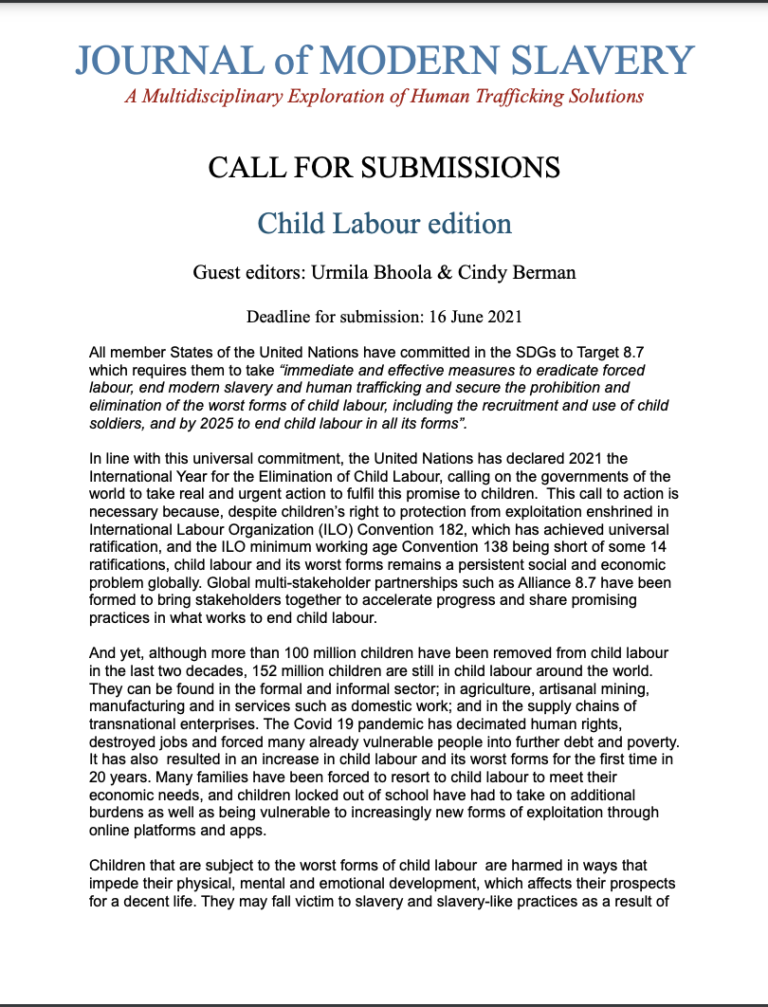Guest editors: Urmila Bhoola & Cindy Berman
This edition is concerned with long-term solutions and prevention of child labour – tackling root causes and drivers, as well as enablers of long-term solutions that demonstrate progress and promise towards eliminating child labour in the long term. The editors are seeking papers that recognise the complexity and multi-dimensionality of tackling child labour, as there is little evidence that short-term ‘projects’ deliver lasting change. The editors are looking for contributions of theoretical frameworks, interventions and practical examples that demonstrate promise in interrupting the drivers of child labour and offering pathways to long-term progress.
The editors are seeking papers that go beyond description of the problem of child labour in particular places and sectors, beyond aspirational declarations of what ‘should’ happen. Instead, the editors are seeking new insights in tackling child labour — lessons and examples from experienced researchers and practitioners that are solution based, reflecting an honest assessment of what hasn’t worked, as well as what has, and why. This will, in a more concrete way, contribute to achieving SDG Target 8.7 in the foreseeable future.
Cross-cutting issues include but are not limited to poverty, gender discrimination, social exclusion and migration – and other factors that may exacerbate vulnerability to exploitation and abuse of children and adults.
The following themes and issues are suggested, but should not limit contributions:
1. What laws, policies, interventions, and regulatory systems have been effective, ineffective or harmful for child labourers and why? These may include:
- laws, policies, and regulations governing child labour, including worst forms
- Educational interventions
- Social protection measures (e.g cash transfer programs)
- Laws, regulations, and labour governance schemes aimed at businesses and employers (e.g. transparency laws, human rights due diligence, self-regulatory schemes)
2. What specific partnerships and stakeholder initiatives have demonstrated successes, lessons or failures in tackling child labour? These may include:
- private sector coalitions – commodity, country or sector
- multi-stakeholder initiatives
- international organizations
- worker-led initiatives
- civil society / faith-based initiatives
- critical combinations of actors, processes and approaches
3. What geographic or area-based initiatives have succeeded or failed and why? Examples could include, but are not limited to:
- interventions working with local communities, cities, municipalities, states/ provinces
- whole-of-government based initiatives to tackle specific problems in specific places
4. What has been the impact of COVID-19 on child labour? May include, but not limited to:
- gender impacts
- domestic violence
- poverty and unemployment
- temporary interruptions in education
- loss of school meals etc.
- strategies to mitigate these impacts
5. Rehabilitation and recovery—social, psychological, health-based initiatives (e.g. to build psycho-social well-being and recovery to mitigate the impacts of child labour on mental, physical, emotional health and development)
6. Role of technology
Some of these topics will overlap or weave together.
Final articles should be 4,000-10,000 words, including abstract, footnotes, and author bio.
Full submission guidelines
Submissions should be made via our Scholastica platform
Deadline for submission: 16 June 2021
Review decisions will be made by mid July.
Publication date is planned for September 2021.

